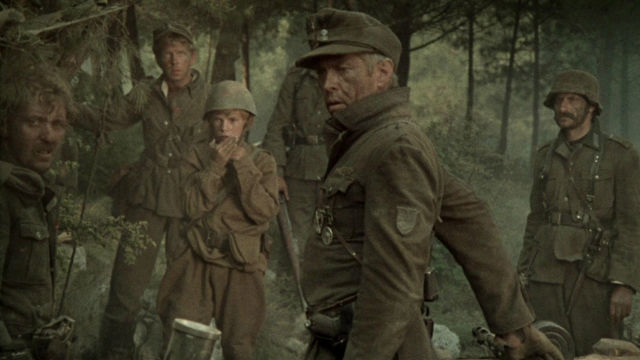Movie Review: Cross of Iron (1977)
“The Power of Peckinpah Has Never Been So Real…Or So Brilliant!”


Cross of Iron (1977)
Director: Sam Peckinpah
Cast: James Coburn, Maximilian Schell, James Mason
Synopsis: A cowardly German officer places a unit in jeopardy as an act of revenge over the sergeant who refused to lie for him.
Like us on Facebook
Catch all our reviews on Facebook.
Outside of the Vietnam conflict, there aren’t many war films that are told from the perspective of the losing side. The obvious forerunner of Cross of Iron, Sam Peckinpah’s corrosive study of men at war, is Lewis Milestone’s All Quiet on the Western Front, which, like Peckinpah’s movie, tells its story from the perspective of a German soldier. Each film carries the same message, but whereas All Quiet on the Western Front focuses on the raw recruits that were thrown into the carnage of WWI with the barest minimum of training, Cross of Iron, an adaptation of the novel by Willi Heinrich, examines the effect of war on a seasoned WWII soldier who has become disillusioned with the officers whose decisions result too often in the death of his men.
Corporal Steiner, played with distinction by a sorely undervalued James Coburn (The Magnificent Seven, Pat Garrett & Billy the Kid, follows the orders of his commanding officer, Colonel Brandt (James Mason – The Mackintosh Man, The Boys from Brazil) with the weary resignation of a man who knows that to question them would be pointless. The network of underground bunkers in which the Germans are camped is under near-constant bombardment from enemy fire, and in a perpetual state of chaos. Steiner does his job, but we can tell he does it more through loyalty to his comrades and the involuntary will to stay alive than from any higher ideals he might once have had. The German dream of an Aryan master race of blue-eyed blondes now squirms in the muddy, blood-stained fields of Russia. The tide is turning, and the German retreat is under way.
Into this arena strides Captain Stransky (Maximilian Schell – Little Odessa, St. Ives), a vainglorious martinet who flinches at the sound of exploding shells. Steiner sees through him in the course of a single conversation, and Stransky knows it, even if his arrogance won’t quite allow him to accept the fact. But, while Steiner and his men are withstanding a Russian onslaught, Stransky has a table on his back and is hysterically calling for reinforcements. Later, the officer attempts to rewrite history by falsely claiming the credit for gallantly leading the men into battle. He hopes to receive the Iron Cross for ‘his’ exploits, because for a member of the Prussian aristocracy to return from the arena of war without one is unthinkable. He even attempts to coerce Steiner into joining him in this obscene charade by asking him to sign a witness statement.
Steiner is one of those characters whose straightforward principles mask a complex personality; he doesn’t say anything if it doesn’t need saying, and is aware, in a way his own superiors could never be, of the cumulative effect of the unceasing psychological pounding his men undergo each day. Steiner is no conventional hero, but he is a man we can admire for hiding the stresses the war places on his own mind from his men, and Coburn communicates this burden admirably in a performance that relies as much on looks and expressions as words. His stoicism is countered by Schell, who translates Stransky’s cowardice into finely measured twitches. Stransky’s cowardice isn’t the kind that reduces its victim to a quivering wreck; it reveals itself in his screaming stridency and fumbling incompetence, and Schell portrays convincingly a man whose mind simply won’t function correctly under extreme conditions.
Peckinpah has a reputation for glorifying violence, and while he doesn’t flinch from showing it in Cross of Iron, it is never gratuitous, and is used to show just what a degrading and dehumanising business war is. The colours are subdued – greys and browns and greens drained of any vibrancy – and is an approximation of the world as seen by those who are forced to fight for a cause in which they no longer believe. The screenplay was co-written by Julius Epstein (with Walter Kelley), who wrote Casablanca back in the 1940s, and is a somewhat surprising source for what was arguably cinema’s most grimly realistic war movie until Saving Private Ryan. By focusing on Steiner, the movie does narrow its scope a little too much – it would have been nice to learn more about the men alongside whom he is fighting – and relegates Stransky to the sidelines for long stretches, but otherwise, Cross of Iron is a grim, unrelenting study of the psychological burden of war that still packs a punch nearly forty years after it was released, and it’s unorthodox ending – a fortunate accident of circumstance due to lack of funds – remains a classic moment from the history of war movies.
(Reviewed 10th November 2016)
httpv://www.youtube.com/watch?v=AonZdAfEQgA

0 Comments